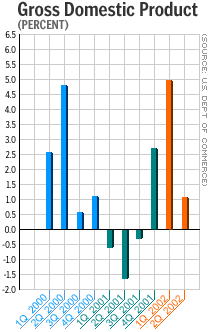NEW YORK (CNN/Money) -
Federal Reserve Chairman Alan Greenspan said the U.S. economy had slowed down and called on Congress to keep an eye on the federal budget, even as he defended last year's large tax cut.
Echoing the Fed's report Wednesday that economic growth had slowed, Greenspan said the central bank might need to lower its July estimate of growth in U.S. gross domestic product (GDP), the broadest measure of the economy.

When Greenspan testified before Congress in July, he said the Fed expected GDP growth of between 3.5 percent and 3.75 percent in 2002 and growth between 3.5 percent and 4 percent in 2003.
Fed policy makers are scheduled to meet on Sept. 24 to discuss their target for short-term interest rates. Greenspan offered no hint about what their decision might be -- they've left rates alone after 11 cuts in 2001 -- but he said he thought there was plenty of economic stimulus in the pipeline.
He also warned that the erosion of federal budget discipline could raise long-term interest rates, hampering the ability of businesses to borrow money and pushing mortgage rates higher. Low mortgage rates have supported a red-hot housing market that has boosted homeowners' wealth.
"To date, the economy appears to have withstood this set of blows well, although the depressing effects still linger and continue to influence, in particular, the federal budget outlook," Greenspan said in prepared testimony for delivery before the House Budget Committee.
U.S. stock prices fell in midday trading as Greenspan spoke and after President Bush addressed the United Nations, asking for the removal of Saddam Hussein from power in Iraq.
The incredible shrinking surplus
According to the Congressional Budget Office, the difference between government spending and income will be $300 billion wider for fiscal year 2002 than projected a year ago, Greenspan noted.
The White House Office of Management and Budget has projected a budget deficit of about $150 billion this year -- the first since 1994 -- and Republicans on the Senate Budget Committee expect that deficit to expand to $200 billion in 2003.
And the Congressional Budget Office's projected 10-year surplus has shrunk from $5.6 trillion in 2001 to just about $300 billion now.
Greenspan said much of the damage to the budget was due to a decline in tax revenue from temporary factors, such as the recession that began in March 2001 and sharp declines in U.S. stock prices this summer.
But in response to a lawmaker's question, he admitted that most of the disappearance of the projected 10-year budget surplus was due to last year's $1.6 trillion tax cut. The cut was proposed by President Bush, and Greenspan supported it in January 2001, calling it a way to reduce what he called dangerously high government surpluses.
"Mr. Greenspan is at least partly to blame for the turnaround in the fiscal position here -- his musings on the problems of ever-increasing surpluses were a clear green light to Congress to cut taxes," Ian Shepherdson, chief U.S. economist at High Frequency Economics Ltd., said in a note.
Greenspan also admitted that the projected 10-year surplus was based on inaccurate predictions by the Congressional Budget Office about higher stock prices and other factors affecting tax revenue.
"The expectations of the relationship between the stock market, capital gains, stock options, bonuses, withdrawals on 401(k)s and IRAs all were overestimated," Greenspan said.
Still, in response to another question, Greenspan said he thought it would be a bad idea to rescind the tax cut, since only about $500 billion of the cut remained to be applied in the coming years, that Congress would likely resist rescinding it, and many small businesses had made borrowing and spending plans based on it.
| |
 More on Iraq
More on Iraq
| |
| | |
| | |
|
Greenspan said he didn't want to comment on additional tax cuts that might be proposed by Bush, but he did support the repeal of the estate tax and said ending double taxation of dividends and capital gains was desirable.
He also said in his prepared remarks that the government's fiscal position is better than it was a decade ago, when the national debt was approaching 50 percent of GDP.
Greenspan did not specify whether he was talking about total debt or just public debt instruments. Currently, the total national debt is about 66 percent of GDP, while public debt is 38 percent of GDP. The Fed did not return calls seeking clarification, but a spokesman for the Congressional Budget Office said economists usually focus on the public debt ratio.
In response to another question, Greenspan said he would be surprised if a U.S. war in Iraq caused a prolonged increase in oil prices and a subsequent recession.
"It is factually the case that past spikes in oil prices have preceded recent recessions, but I think that's accidental," he said. "The impact now of a spike in oil prices presumably would be less than it has been in the past."
But he also said that if a war in Iraq lasted too long, it could have a negative impact on the economy.

|

